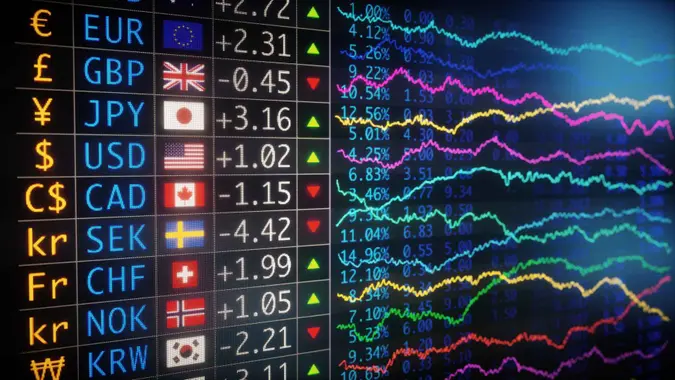Are Speculative Investments Worth the Risk? What To Know About These 3 Types

Commitment to Our Readers
GOBankingRates' editorial team is committed to bringing you unbiased reviews and information. We use data-driven methodologies to evaluate financial products and services - our reviews and ratings are not influenced by advertisers. You can read more about our editorial guidelines and our products and services review methodology.

20 Years
Helping You Live Richer

Reviewed
by Experts

Trusted by
Millions of Readers
A speculative investment — or “when an investor hopes to profit from a rapid change in the value of an asset,” according to SoFi — can be fairly high risk, unlike traditional investments. Indeed, these tend to see frequent price movements and as such, can also be highly rewarding and provide portfolio diversification.
“Rather than buying investments and holding them for long periods of time, speculators try to take advantage of short-term volatility in the market,” Robinhood detailed. “Speculation generally involves trying to profit from a large market swing.”
Here are a few examples of speculative investments.
Entering the ‘Junk’ Bond Market
There are many factors that can affect the bond market, including the direction of interest rates and macro-economic factors. As such, SoFi explained that the prices in the U.S. Treasuries market are often strongly influenced by speculation.
There are differences in the types of bonds and the risk-reward profiles they carry. For instance, highly rated bonds are not considered speculative, while lower-rated bonds are considered speculative and referred to as “junk bonds.”
“Since junk bonds are riskier, they pay out higher interest rates to investors,” SoFi indicated.
Playing With Precious Metals
Precious metals such as gold and silver are speculative investments that fluctuate in price constantly. As Morgan Stanley noted, these may experience both short-term and long-term price volatility.
“The value of precious metals investments may fluctuate and may appreciate or decline, depending on market conditions. If sold in a declining market, the price you receive may be less than your original investment,” Morgan Stanley added.
Short-Term Investment in Foreign Currencies (Forex Trading)
Foreign currencies (Forex) trading involves buying and selling currency pairs, per SoFi.
“As the value of one currency goes down, the other goes up. Traders speculate on which way the relationship will go and hope to profit off the change in value,” SoFi added.
Since these markets are open 24 hours a day, Forex trading is popular with speculative investors. It should be noted that a variety of recent scams have hinged around fraudsters approaching marks — typically offering investment or coaching in Forex trading, as the Commodity Futures Trading Commission outlined.
 Written by
Written by  Edited by
Edited by 

























